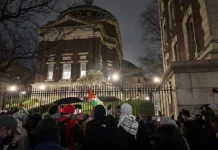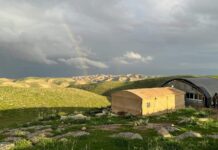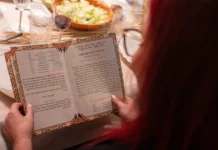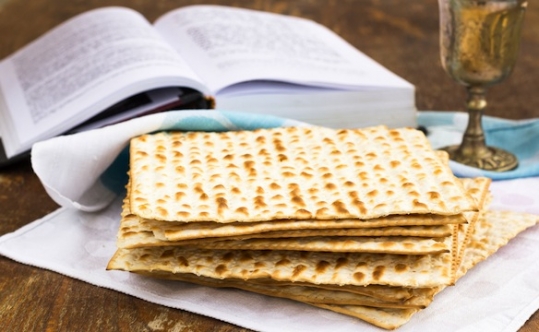Two synagogues with deep histories in New Jersey have initiated an educational experiment, not only to teach their children, but to create “outreach to hundreds of families…unaffiliated with Jewish life and give them a quality Jewish education,” according to Rabbi Stuart Pollack of Har Sinai.
Adath Israel Congregation, the 93-year-old Conservative synagogue in Lawrenceville, and Har Sinai Temple, the 160-year-old Reform congregation in Pennington, are establishing the Jewish Community School (JCS), launched on Sunday, May 21, and scheduled to open in the fall.
Magda Reyes, Har Sinai’s director of education, will lead the school. She acknowledged that a decline in membership and school enrollment was the initial impetus for creating JCS, but added that leaders of both congregations have committed to creating “a resource for Jewish education in our community” that will offer a quality Jewish education to students from both synagogues and beyond. There will be a focus on inclusion. “We are aiming to make the new school a welcoming place for Jews of color, LGBTQ Jews, and interfaith families, where they can feel welcome,” Reyes said.
In line with this vision, Reyes applied and was accepted to the first cohort of the Union for Reform Judaism’s Jew V’Nation Fellowship, which supports “through classes and grants programs that aim to include Jews on the margin, Jews that have not been able to find a place in Jewish life.” Her fellowship project is developing and managing the new school.
To attract unaffiliated Jews, the new school is removing the “barrier of synagogue membership” for students who are in fourth grade and below. The aim is for unaffiliated “younger families to get engaged in Jewish life, make friends, and build relationships within the school environment, and then…choose a synagogue,” Reyes said.
The school will also hold events designed to meet Jews in their secular lives; for example: a week of fun activities for children during the last week of summer and picking apples at a local orchard and eating them with honey and challah in celebration of Rosh HaShanah.
“We want to look at all these opportunities to get families together in what they do normally and put a Jewish lens on the activity,” Reyes said. This is also a way to “connect them to other families and connect them to the school and the synagogues.”
Over the last two years, the organizers have been fine-tuning the details of and educational program for students from different denominations, with compromises struck on such matters as b’nei mitzvah preparation, kashrut observance, wearing kipot, and Shabbat observance. They also worked out such issues as time spent in religious school, finances, and the specifics of the course of study. JCS will use the Chai curriculum, originally a Reform program, but with a Conservative overlay.
Har Sinai president Alan Kline admitted to some bumps along the way, but they never stopped moving forward. “Beyond anything else, it is about the children,” he said. “If anything gets thrown off course, we go back to: Why are we doing this? It is for the continuity of the Jewish people and for our children, and teaching them how important Judaism is and how important its continuation is.”
The two synagogues are less than five miles apart and the drive is under 10 minutes. Classes will meet Sundays, 9 to 11:45 a.m., and Tuesdays, 4:30 to 6:30 p.m. The new school will be staffed with teachers from both synagogues. Hedda Morton, former director of congregational learning at Adath Israel, left her position at the end of the 2015-2016 school year.
Because the new school will be held largely at Har Sinai, Adath Israel president Stephanie Loesberg said, one compromise is that students will also meet roughly one Sunday and one Tuesday a month at Adath Israel. Another is that since Har Sinai does not observe kashrut, when the students are there, the Adath Israel youngsters will have kosher food available for them.
At the final assembly of the religious school at Adath Israel, the congregation’s Rabbi Benjamin Adler related a story that captured the values of “cooperation, working with other people, being a community.” He explained, “It is what we are trying to do with the new Jewish Community School; we’re taking all the wonderful things about each community and bringing them as a gift to each other.”
Back when both congregations were in their original homes on Bellevue Avenue in Trenton, that sense of community was alive and well, Reyes said. The High Holy Days always saw a flow of people back and forth between the two synagogues. But today, she said, “the Jewish landscape is changing, and we are trying to be responsive to that.”
Pollack of Har Sinai called the new school “an experiment, the joining of Reform and Conservative ideologies for Jewish education in this area…. It is an experiment to see if we can do outreach to hundreds of families we believe are unaffiliated with Jewish life and give them a quality Jewish education.”
Parents of students who spoke to NJJN were also positive about the new school. Hannah McCollum, a Har Sinai member, said, “The idea that you have more kids who could benefit from such well-prepared, enthusiastic educators and a curriculum that is both engaging and incredibly rich in content seemed like a phenomenal idea….
“In a region where the Jewish population is less dense, it makes perfect sense to have institutions team up to bring communities together.”
Both Sharon Sharlin and Jeremy Kestler of Adath Israel expressed anticipation about JCS and said they were looking forward to their children learning among an expanded and diverse population of their peers.
Adler, also a parent of a student at Adath Israel, said he sees added value in a school that will convey the diversity of ways Judaism approaches questions about God, history, and Jewish life. “Our kids will be better Jewish citizens,” he said. “They will be more comfortable in different environments and different synagogues and really understand how people approach Judaism differently.”
One source of support for JCS will be a matching grant from Jewish Federation of Princeton Mercer Bucks who promised $10,000 to synagogues who raised $10,000 or more for a new initiative during their High Holiday Appeal. Adath Israel and Har Sinai each agreed to spend $5,000 of their $10,000 grant to aid the new school.
Adler told NJJN, “This is really the future of the Jewish community. You have to create partnerships because the realities we face are ones we can’t necessarily face alone…. Because the Jewish community is changing, we have to evolve and change our model to meet different needs.”
Reyes agreed. She spoke about her parents, who survived the Holocaust, lived in Slovakia under the communists after the war, and in 1969 left their home, one suitcase in each hand, on a tourist visa, eventually making their way to America. “My parents were older, and yet they picked up and threw everything away,” Reyes said. “They did that to give their children a life, and they wanted to see Judaism survive.
“We have to do the same. We have to adapt, we have to change and find a way.”


























